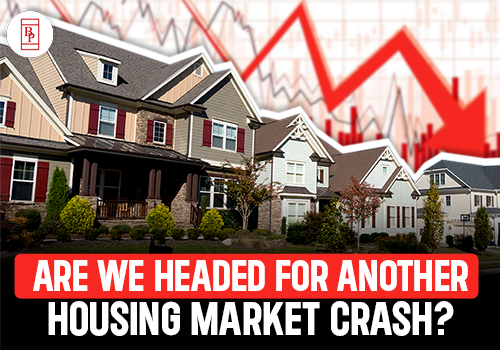Are We Headed for Another Housing Market Crash?
Friday, November 15, 2024

 The question of whether the U.S. housing market is headed for another crash has been on the minds of many, especially after the boom in home prices during the pandemic. The previous housing market crash of 2008 still lingers in memory, and with rising interest rates, fluctuating demand, and increasing market speculation, it's natural to wonder: when will the housing market crash again?
The question of whether the U.S. housing market is headed for another crash has been on the minds of many, especially after the boom in home prices during the pandemic. The previous housing market crash of 2008 still lingers in memory, and with rising interest rates, fluctuating demand, and increasing market speculation, it's natural to wonder: when will the housing market crash again?
To answer that, we must delve deep into the factors currently influencing the housing market and compare them to past conditions, including housing market predictions for 2024 and beyond. For those living in Washington State, particularly in booming areas like Seattle, Bellevue, and Tacoma, the question is even more pressing as the Washington State housing market has seen significant growth, prompting many to consider whether this is sustainable or headed for a decline.
A Look Back: The 2008 Housing Market Crash
To understand whether we are facing another crash, it's essential to first revisit the causes of the 2008 housing market crash. The Great Recession was largely triggered by a collapse in the housing market, which was built on risky subprime loans, irresponsible lending practices, and an over-leveraged financial system. Banks were providing mortgages to borrowers with low creditworthiness, often without verifying their incomes. The result was a massive bubble that burst when many homeowners defaulted on their loans, leading to widespread foreclosures and a steep decline in home values.
In 2008, housing prices fell nearly 30%, and millions of Americans lost their homes. The crisis didn't just affect homeowners—it sent shockwaves throughout the global economy, leading to a severe recession. Are we seeing the same red flags today? Let’s analyze the current market landscape.
Housing Market Predictions for 2024 and Beyond
Economists and real estate experts have mixed predictions when it comes to answering the question: when will the housing market crash again? While some argue that the U.S. housing market is overvalued, others believe that the current economic conditions don't point to an impending crash.
One key factor supporting a more stable housing market is the stricter lending standards put in place after 2008. Banks are no longer as reckless in approving mortgages, and borrowers today generally have better credit scores and financial standing. Additionally, the housing market of 2024 is still benefiting from a shortage of inventory—a lingering effect from the pandemic, supply chain disruptions, and labor shortages in the construction industry. This has created a scenario where demand continues to outstrip supply, which has helped keep prices high.
However, there are some concerns. Interest rates have risen significantly since 2021, which has made mortgages more expensive for potential homebuyers. This has started to cool demand, but with home prices still relatively high in many markets, affordability remains an issue. Some experts worry that if interest rates continue to climb or if inflation remains persistently high, this could lead to a housing market correction or even a crash.
Moreover, housing market predictions for 2024 suggest a slowdown rather than a crash. Fannie Mae, Freddie Mac, and the National Association of Realtors (NAR) have all projected that home prices will level off or experience modest declines, particularly in overheated markets. While this isn’t the type of dramatic drop seen in 2008, it does raise questions about whether certain regions, including Washington State, are more vulnerable than others.
Washington State Housing Market: A Closer Look
Washington State has been a hotspot for real estate in recent years, particularly in cities like Seattle, where home prices have skyrocketed. In 2023, Washington State's housing market remained strong, despite cooling trends in other parts of the country. But can this growth be sustained? Or is the state headed for a housing bubble?
Housing market predictions for Washington State show that while prices are expected to stabilize, certain areas may see more significant changes than others. Seattle, for example, saw some of the highest price increases during the pandemic, driven by the influx of tech workers and remote work. Now, as more companies adopt hybrid work models or return to the office, demand for housing in downtown Seattle has softened slightly.
On the other hand, areas surrounding Seattle, such as Tacoma, Bellevue, and the Eastside, continue to see strong demand. Families and investors alike are drawn to these suburbs, where properties are slightly more affordable compared to the city but still provide proximity to major job centers.
However, as interest rates rise and economic uncertainties loom, some Washington homeowners are beginning to feel the pinch. First-time buyers, in particular, are facing difficulties, as the combination of high home prices and rising mortgage rates make it harder to enter the market. This has led to a slight increase in inventory, which could be an early indicator of a cooling market.
According to housing market predictions for Washington State, it’s unlikely that the state will experience a crash similar to 2008. Instead, experts expect home prices to either stabilize or decrease slightly, particularly in high-demand areas like King County. However, more rural areas of the state, where prices didn’t increase as dramatically, may not see as much of a correction.
Economic Factors Influencing the Housing Market
When evaluating whether we are headed for another housing market crash, it's essential to consider the broader economic context. While housing prices have cooled slightly in recent months, the U.S. economy remains relatively strong, with low unemployment rates and rising wages. This is in stark contrast to the conditions leading up to the 2008 crash when the economy was already showing signs of weakness.
That said, inflation has been a significant concern in 2023 and 2024. The Federal Reserve has responded by raising interest rates in an attempt to curb inflation, but this has also made borrowing more expensive for both businesses and individuals. For the housing market, higher interest rates have translated into higher mortgage rates, which reduces affordability and can lead to a slowdown in demand. If inflation persists or if the economy enters a recession, we could see further declines in home prices.
Additionally, homebuilders have been cautious about ramping up production, given the uncertainties in the market. While this has kept inventory levels low, preventing a significant price drop, it also means that if demand declines further, builders may pull back even more, leading to fewer new homes being built.
Are Certain Markets More Vulnerable?
While the national housing market appears to be stabilizing, some regions may be more vulnerable to a downturn than others. High-demand urban areas that saw the biggest price increases during the pandemic, like Seattle, Austin, and San Francisco, are more likely to experience a correction. These markets benefited greatly from remote work trends, but as more companies require employees to return to the office, demand for urban housing may decrease.
At the same time, rural and suburban areas that saw modest price growth may not see as much of a correction. In fact, many of these areas could continue to see price increases, as people continue to seek out more space and affordability. In the case of Washington State, suburban markets like Bellevue and Tacoma may remain relatively strong, even if Seattle experiences a slowdown.
Investor Activity and Market Speculation
Another factor to consider is the role of investors in the housing market. During the pandemic, many institutional investors and private equity firms began purchasing large numbers of single-family homes, particularly in high-demand areas. This influx of investor activity helped drive up home prices but also contributed to concerns about speculation.
If the market starts to cool, some of these investors may begin to sell off properties, which could lead to an increase in inventory and put downward pressure on prices. However, investor activity remains strong in many markets, and some experts believe that investors will continue to see real estate as a valuable asset, even in a cooling market.
Conclusion: Are We Headed for a Crash?
While the question of when will the housing market crash again is on the minds of many, the reality is more complex. The current economic conditions—rising interest rates, inflation, and slowing demand—suggest that the housing market is headed for a period of stabilization or modest decline rather than a dramatic crash.
In Washington State, the housing market is likely to see some cooling, particularly in areas like Seattle, where prices have risen rapidly in recent years. However, strong demand in suburban markets and a shortage of inventory should prevent a significant crash. Overall, the U.S. housing market remains fundamentally stronger than it was in 2008, thanks to tighter lending standards and a healthier economy.
For potential buyers and investors, this means that while opportunities for rapid appreciation may be limited, the risk of a catastrophic crash remains low. As always, the best strategy is to stay informed about local market conditions and make decisions based on long-term financial goals rather than short-term speculation.




